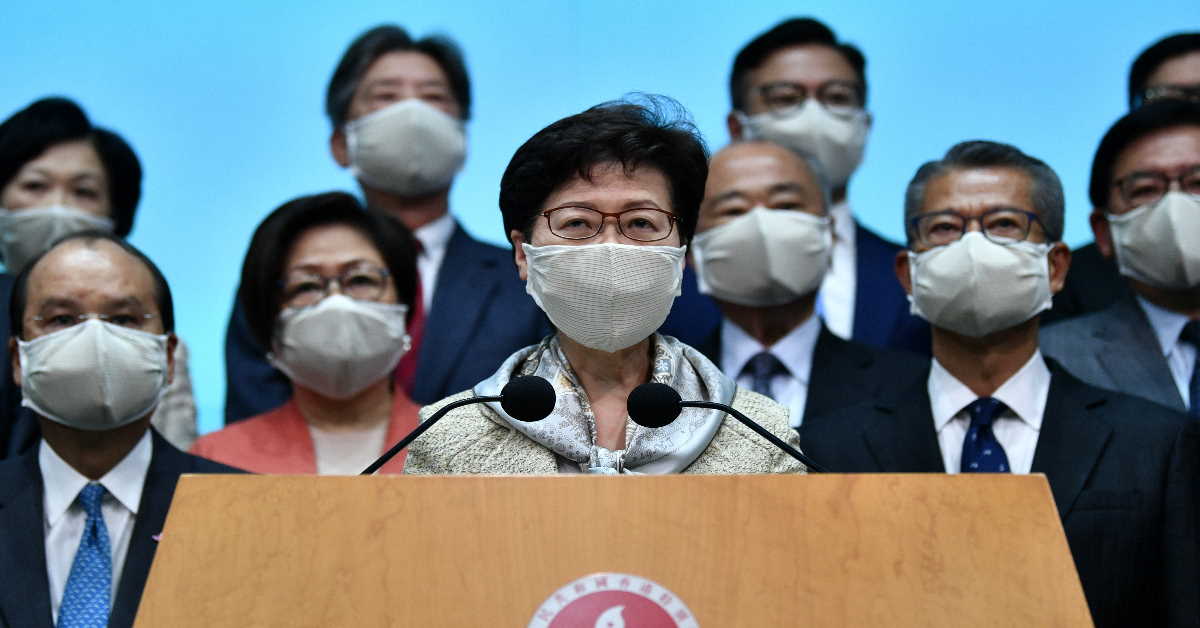China drew Western condemnation on Friday over plans for a national security law to quash Hong Kong's pro-democracy movement as it opened an annual congress that also laid bare the "immense" economic challenges caused by the coronavirus.
The 3,000-member National People's Congress (NPC) began with a minute of silence for China's victims of the coronavirus before Premier Li Keqiang delivered his annual version of the United States (US) president's "state of the union" address.
"At present, the epidemic has not yet come to an end, while the tasks we face in promoting development are immense," Li told mask-wearing delegates in Beijing's cavernous Great Hall of the People, while also touting China's success in suppressing the contagion.
The pandemic forced Beijing to delay its annual parliament by two months and reduce its length to a week.
Citing "great uncertainty" ahead, Li took the rare move of refraining from announcing a 2020 growth target for China's pandemic-battered economy, offering only a vague promise to address mounting joblessness and to improve living standards.
Hong Kong Under Siege
The most controversial move at the NPC opening was the introduction of a proposal to impose a security law in Hong Kong – immediately denounced by Washington and pro-democracy figures in the financial hub who called it a death sentence for the territory's unique freedoms.
China made clear it wanted the law passed after Hong Kong was rocked by seven months of massive and sometimes violent pro-democracy protests last year.
US Secretary of State Mike Pompeo urged China to reconsider the "disastrous proposal", saying it would "be a death knell for the high degree of autonomy Beijing promised for Hong Kong."
The European Union (EU) called for "the preservation of Hong Kong's high degree of autonomy".
The foreign ministers of Britain, Australia and Canada said in a joint statement they were "deeply concerned" over the proposal, saying passing such a law without the direct participation of Hong Kong's people or legislature would undermine the principle of "one country, two systems".
The motion, which goes to a vote in China's rubber-stamp legislature on Thursday, would authorise Chinese lawmakers to directly enact long-delayed Hong Kong security legislation itself at a future date, rather than leaving it up to the territory's administration.
The draft proposal will "guard against, stop and punish any separatism, subversion of the national regime, terrorist group activities and such behaviours that seriously harm national security".
City leader Carrie Lam, who attended the session, vowed to "fully cooperate" with Beijing over the national security proposal and complete the legislation "as soon as possible".
Lam said national security laws to be drafted later by the NPC seek "to punish 'Hong Kong independence' and violent political elements that seriously harm national security".
An initial bid to enact such legislation in 2003 was shelved after half a million people took to the streets in protest.
Wang Chen, deputy chairman of the NPC Standing Committee, told delegates Beijing must "take powerful measures to lawfully prevent, stop and punish" anti-China forces in Hong Kong.
One of the proposal's articles opens the door for Beijing to increase its presence in the financial hub by allowing the central government to set up, "when needed", agencies in Hong Kong "to fulfil relevant duties to safeguard national security in accordance with the law."
China's army already has a garrison in Hong Kong but soldiers have not intervened in the protests, though the city's mini-constitution authorises local officials to request military help to protect public order.
"This is the end of Hong Kong, this is the end of 'One Country, Two Systems', make no mistake about it," Civic Party lawmaker Dennis Kwok told reporters, referring to China's description of the territory's status.
The system gives Beijing ultimate political sway but allows liberties unseen elsewhere in China.
Stocks tumbled in the city Friday on news of the security law move.
President Donald Trump has promised to respond "very strongly" once details emerge, and US senators introduced legislation to impose sanctions on any entity involved in curbing Hong Kong's autonomy.
Targets could include police who crack down on demonstrators, Chinese officials involved in Hong Kong policy, and banks that conduct transactions with anyone who infringes on its freedoms.
Economic Uncertainty
Although infection numbers have dwindled, China is still recovering from the COVID-19 outbreak that first appeared in the central city of Wuhan late last year and spread globally.
Beijing has faced accusations led by Trump it mishandled its initial response, leading to more than 330,000 deaths and economic carnage worldwide, as well as sending US-China tensions spiralling to new depths.
China's economic growth shrank 6.8 percent in the first quarter because of the virus, its first contraction in decades.
Li had originally been expected to announce a 2020 growth target of around six percent – but the pandemic has scrambled expectations, leaving millions of Chinese jobless and imperilling countless businesses.
Still, the government announced Friday it would increase its military budget by 6.6 percent.
The budget will be set at 1.268 trillion yuan (US$178 billion) for the year – the second biggest in the world after the US but continuing a trend of slowing increases. - AFP
